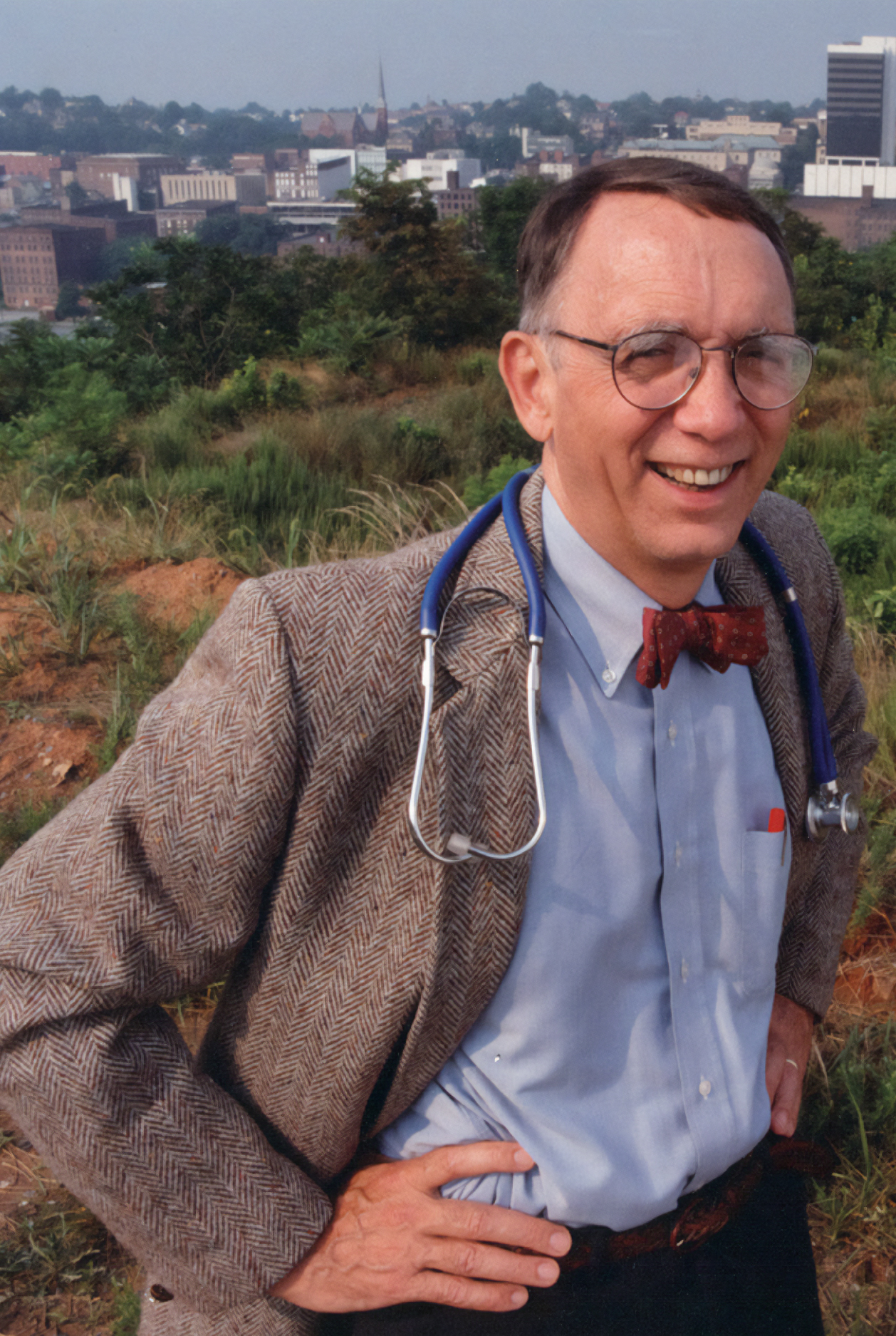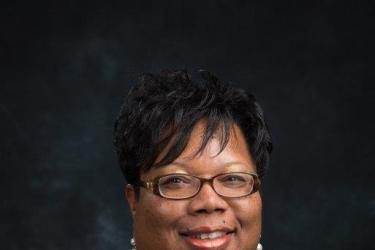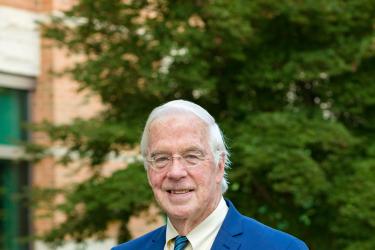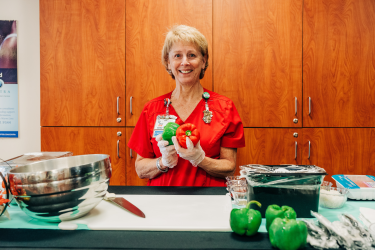Virginia Baptist Hospital Centennial
Centra’s Intensive Care Nursery (ICN) opened in November of 1972 at Virginia Baptist Hospital, and Dr. Peter W. Houck served as its first medical director. Dr. Houck’s extensive legacy as a provider includes pioneering work in neonatology and active involvement in caring for the Lynchburg community as a pediatrician.
A native of Lynchburg, Dr. Houck was the second of four sons born to Dr. Joseph W. Houck and Katherine Kemp Houck. He went to elementary school at Garland-Rodes Elementary School, spent two years at Virginia Episcopal School and then graduated from E. C. Glass High School. Dr. Houck married his high school sweetheart, Elizabeth “Betsy” Tweedy in 1962, and they had five children.
After graduating from the Virginia Military Institute, Dr. Houck attended medical school at the University of Virginia and served with the Army Medical Corps at Fort Polk in Louisiana before completing a fellowship at Parkland Memorial Hospital in the budding specialty of neonatal medicine. Asked to return to Lynchburg by Dr. Edward Vaden, Dr. Houck moved back to the Hill City in 1971 and began working to establish the state’s first non-university-based neonatal intensive care nursery at Virginia Baptist Hospital.
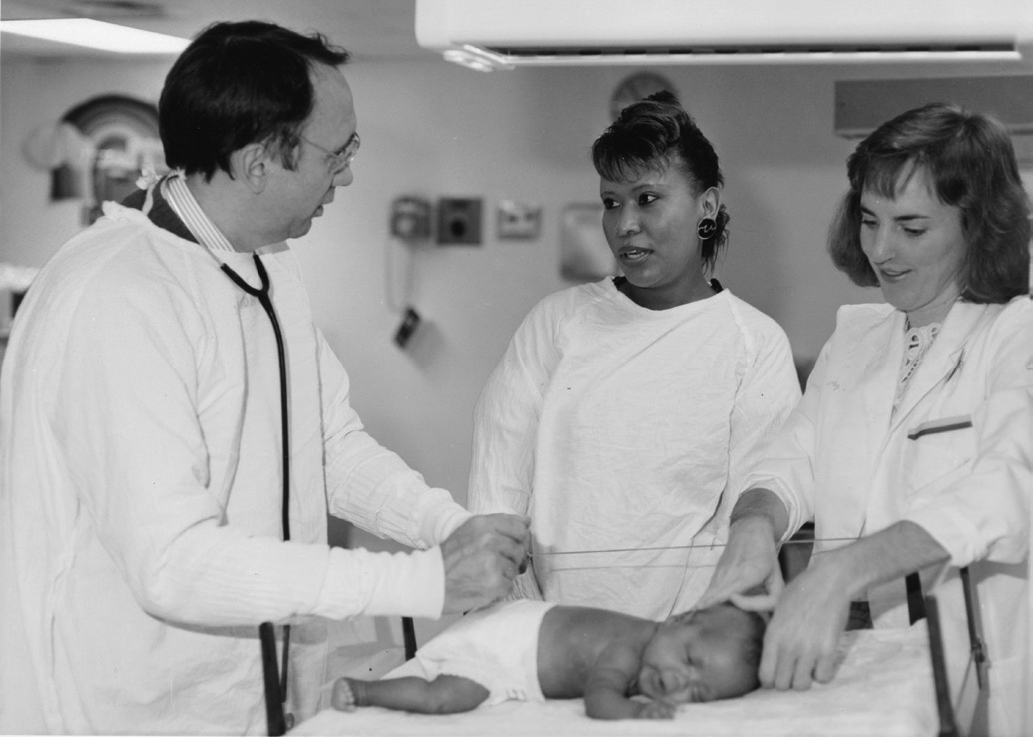 When the ICN opened, Dr. Houck was one of only three neonatologists practicing in Virginia. He helped to teach nurses and respiratory therapists about managing the care of sick neonatal infants, and his leadership was instrumental in reducing the infant mortality rate in Lynchburg within a remarkably short span of time. One year after the unit opened, the rate had decreased from 12 deaths per 1000 to 8 deaths per 1000. Dr. Houck was also a champion for establishing perinatal regional centers across the commonwealth of Virginia that could care for babies who needed more advanced care than what a community hospital could provide–Virginia Baptist Hospital served as one of these centers.
When the ICN opened, Dr. Houck was one of only three neonatologists practicing in Virginia. He helped to teach nurses and respiratory therapists about managing the care of sick neonatal infants, and his leadership was instrumental in reducing the infant mortality rate in Lynchburg within a remarkably short span of time. One year after the unit opened, the rate had decreased from 12 deaths per 1000 to 8 deaths per 1000. Dr. Houck was also a champion for establishing perinatal regional centers across the commonwealth of Virginia that could care for babies who needed more advanced care than what a community hospital could provide–Virginia Baptist Hospital served as one of these centers.
The opening of the ICN in 1972 also led Dr. Houck and his team to develop a neonatal transport van in partnership with the Lynchburg Lifesaving Crew the following year. This van allowed premature infants to be transported from surrounding communities to the ICN in Lynchburg.
Serving as an extension of Centra’s ICN, this specially equipped vehicle was the first neonatal ground transport system to be established on the East Coast. Their first transport was of a one pound eight-ounce baby girl. As the van continued to be used, the mortality rates related to pre-term infants being transported dropped drastically. Originally sitting at 37% when the system was begun, the number was reduced to 5% by 1983.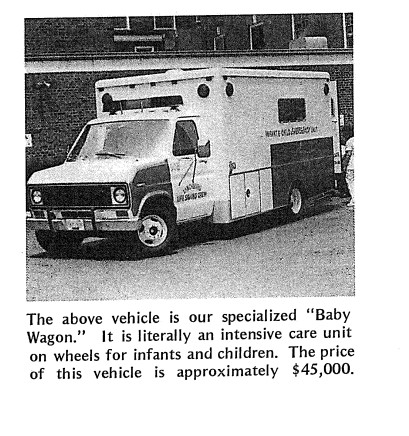
There is no doubt that Dr. Houck’s legacy continues to this day. In addition to working at VBH, he pursued a career in pediatrics at F. Read Hopkins Pediatric Associates and later directed the Johnson Health Center. He was an active member of the Lynchburg Historical Foundation in addition to founding the Warwick House Publishing Company and the Sandusky Civil War Museum.
Furthermore, over the last fifty years, Centra’s neonatal ground transport system has continued to evolve and serve countless neonatal patients. Currently, NeoOne services an 8,000 square mile area that includes Bedford, Danville, Farmville, Gretna and Halifax.
Dr. Houck’s legacy is best characterized by the memories of those who worked with him personally. Mary Highton, DNP, APRN, NNP-BC, served as the first transport nurse for the vehicle and worked with Dr. Houck for many years. She described Dr. Houck as a renaissance man who had a deep care for his patients, their families and each of the Caregivers who worked in the ICN. In addition to sharing memories of him often affirming the nurses he worked with through encouraging notes or letters, Mary recalled one especially poignant memory of the pediatrician:
“Dr. Houck and I were returning from doing an educational program in Danville. We were on our way back home to Lynchburg, and he asked if I minded if we took a detour. He wanted to ‘swing-by’ and see one of our former patients who had an extensive stay in the ICN. He had been discharged but continued to have chronic lung issues. He had this little guy on his mind and wanted to just check on him even though it had been a long day. That was an example of how he was always going above and beyond.”
Dr. Houck's legacy lives on not only in the countless lives he touched throughout his remarkable career, but also through the many individuals who he inspired to always go above and beyond in their service of others.

